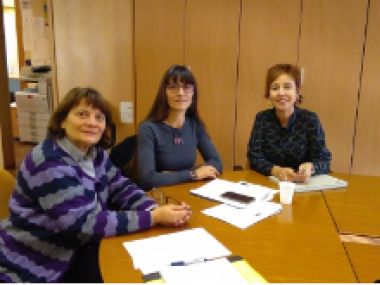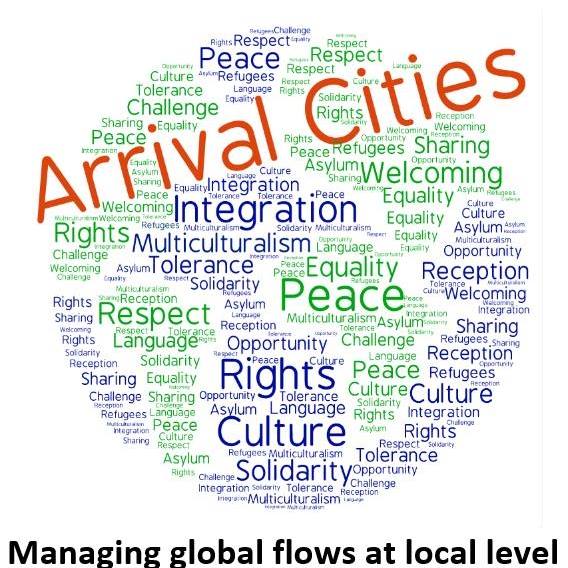The Portuguese NUP interview our Network Lead Partner
Edited on
02 October 2018We publish the english version of the interview held in December by Dra. Ana Resende, representative of the Portuguese National URBACT Point, to Dra. Ana Tomas, ARRIVAL CITIES Transnational Coordinator and Dina Moreira, Strategy Manager of this project. The interview has been published in Portuguese http://urbact.eu/entrevista-ana-tom%C3%A1s-e-dina-moreira-projeto-arrival-cities-cm-amadora-nov-2016 but we find interesting to propose an English version, as a synthesis of the project experience had so far by the Municipality of Amadora in the role of lead partner of the Arrival Cities Project.

I begin by asking the same question to both. Have any of you had any contact with the URBACT program before starting this recent experience?
Ana Tomás - I participated in one of the actions promoted by the pilot project MILE (PO URBACT II), at that time I collaborated in organization of the meetings in the framework of that project. The municipality of Amadora was one of the partners involved in MILE project between 2007 and 2009. This thematic network aimed to support the cities in the development of an exchange program focused on "Immigration management and integration at the local level".
Dina Moreira - Contrary to my colleague, I had never been involved in an URBACT project.
Currently, Amadora participates in an APN (Action Planning Network), ARRIVAL CITIES, as lead partner. What was the path that allowed the municipality to get here?
The Municipality engagement is related to the experience acquired in the issue of migrants integration, and reflected not only in the participation in the project mentioned above, but also to the development of several other initiatives promoted by the Municipality, and among these the "Do not Feed Rumor!" is the most emblematic.
This project, realized between January 2014 and June 2015 had as main partner the Council of Europe, and brought together a wide range of European cities from different countries. The creation of an anti-rumor network in each city, involving public administration, social organizations and citizens was the motto for the constitution of "anti-rumor agents" aiming to fight against common misconceptions, stereotypes and prejudices that target the immigrant population and ethnic minorities.
Although without European funding, the campaign was brought forward by the Municipality and this was the ground and a leverage factor for the proposal we submitted to this third URBACT call, that received a strong support of the local government.
On the other hand, the Municipal Plan for the Integration of Immigrants 2015-2017, which was financed by the High Commission for Migration, certainly contributed to the design of the future URBACT action plan.
And the projects you mentioned had some public disclosure?
As for the "Do not Feed Rumor!" project, we have developed an ambitious campaign, because we want to change the image of both the immigrants which is still very negative and the municipality itself.
Three videos were produced, in Portuguese and English: one with the general presentation of the project; a second one, which we call the memorial of the project, that contains the synthesis of actions; and the latter is a record of immigrant testimony. These videos were produced by TV Amadora and can be viewed on the website and Facebook page of the project or on YouTube. The project was also disseminated in a workshop organized by the Portuguese Network of Intercultural Cities.
We also believe that the dissemination of this kind of actions must be done permanently and be anchored in a strong political commitment.
Returning to the idea of the ARRIVAL CITIES network, did you have many proposals for membership from other European cities?
Yes, the proposal immediately generated a positive reaction, a very high number of cities, more than four dozen, wanted to integrate the partnership. Choosing the partners was not easy, but the orientation of URBACT to have a good geographical coverage, the need to include cities that are facing the same challenges of migration flows, and the clear interest in immigration and refugee issues, were the guidelines that oriented our decision.
We now have a partnership that includes cities in the South (Spain, Greece, Italy and Portugal), where the refugee problem is increasingly pressing, but also the Center (France and Germany) and the North (Finland and Latvia). In the latter two countries there has been an increase in negative attitudes towards immigrants. In Latvia, the number of third-country nationals with temporary residence permits has tripled between 2009 and 2015 and Vantaa, Finland, is receiving new flows of migrants, refugees from conflict in Syria, Afghanistan and Iraq.
How the relations with the other partners and the thematic expert have been developed? And which benefits did they receive from transnational meetings?
To date, we have held three face-to-face Steering Group meetings (SG) and one Transnational Thematic Workshop (WT). The SG meetings were coordination meetings aiming to define the project guidelines and orientation. They took place in different cities but, unfortunately, it will not be possible to cover the entire partnership in geographic terms. We have also used Skype in situations where it was not possible to have the physical presence of some partners and we have in plan to organize online conferences.
As for the WT, they are organized around themes related to the challenges that cities wanted to address and which reflected in their action plans. These are more open events, with other dynamics that include also study visits. The first WT focused on how to build social cohesion, related to the tackle stereotypes and prejudices and to foster the inclusion of newcomers. The second WT, to be held in January 2017 in Vantaa, will focus on labour integration of immigrants and refugees.
The role of the thematic expert is crucial and our lead expert has great experience in the theme of the network and in the transnational articulation. He is responsible for the production of the document framing the theme under analysis. The document is the basis for discussion within the ULG about the theme and to raise questions to be worked out and the proposals on actions to be developed.
The added value of the exchange with other cities is the opportunity to know how they are dealing with problems that are similar to ours, what strategies they are implementing, thus contributing to the improvement of our intervention in the territory of Amadora.
Within the partnership, can you identify a city that is particularly inspiring for you?
All the presentations made under the WT were very interesting, but the case of the city of Dresden, Germany, was the one that most interested us, in relation to the concerns of Amadora and our "Do not feed Rumor!" campaign. The city of Dresden deals closely with the issue of fears and prejudice of inhabitants toward the immigrants, in a context with a tradition of broad public debates, fostered by the local Red Cross. It is an informal movement, led by civil society.
And how does Ana see the partnership leadership exercise? Do you find it particularly difficult?
I would say that beyond the difficulty, it is a very enriching daily challenge. I have never coordinated an international project with these characteristics, but the personal and institutional relations that have been established make this role special and particularly interesting.
Finally, I have one last question to ask Dina, since she was the only one of you to attend URBACT Summer University (USU). How do you describe this experience?
I found the USU very interesting. The idea of creating a virtual city - Avalon - seemed fantastic to me because then no one would have the tendency to bridge the problems of their city to the group work developed within the USU.
The organization was excellent, especially given the high number of participants and the amount of work required in just a few days.
The event was very intensive, but at this far I consider, that it could not have been otherwise considering the objectives that were set. I also want to highlight the mutual support established between the participants in the working groups, as well as the informal environment that permeated the whole event.
 Submitted by cvestrini on
Submitted by cvestrini on
